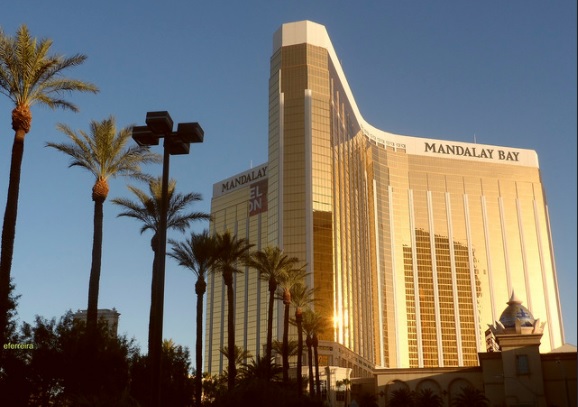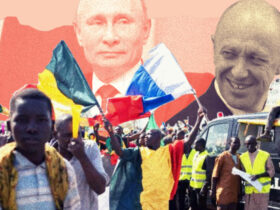
Aziza: Was it terrorism?
After news broke of the Las Vegas mass shooting, the same pattern of actions quickly emerged that has become a defining part of America’s response to grief. The Left demanded stricter gun laws. The Right refused to point at the Second Amendment for blame. Both sides expressed their condolences and prayed for the victims and their families. Yet what was new to the cycle of grief this time was a heated public debate over the question whether this, too, was an act of terrorism.
In the past, specifically after the deadly shootings in San Bernardino and Orlando, the American news media and public didn’t hesitate to use the term “terrorism” to describe the horrific events. In both cases, the perpetrators were Muslim, with Middle Eastern-sounding names. News media sources circulated photographs of the attackers portraying their ethnically Middle Eastern appearance. After days of investigation, both cases were confirmed as acts of terrorism by the federal agencies. They were violent, they were targeted against civilians, and they were motivated, at least in part, by violent, extreme Islamism.
Note the last point. It was the motivation of the perpetrators that set these terrorist acts apart from other acts of violence — not their appearance or ethnicity. Although the exact definition of terrorism is heavily debated, most scholars agree that what makes terrorists terrorists is the fact that they don’t simply commit violence for the sake of causing harm: They are politically, religiously or socially motivated, and they are striving to achieve some higher goal through their acts that go beyond the immediate damage.
We do not know what motivated Stephen Paddock when he opened fire on visitors of the Route 91 music festival Sunday night. His act was staggeringly inhumane. But was it terrorism? As long as investigators don’t know the motive, we don’t know whether it was terrorism. And while the media should take this time to reflect on its racially biased usage of the term “terrorism” in the past, this time around, the media — which is for the most part refraining from calling the act “terrorism” despite calls by the public figures to do so — is actually doing it right.
Miles: The Right’s Hypocrisy
Following the Las Vegas mass shooting Sunday night that left 58 dead and about 500 injured, and after which the shooter, Stephen Paddock, was found dead with 23 guns in his hotel room, Democratic members of the Congress and the Senate, as the left at large, immediately called for common-sense gun reform. Those demands were met with two predictable, worn-out retorts by those on the right:
First, Democrats shouldn’t be “politicizing” such horrific events. Second, while we can regulate guns, we can’t “regulate evil,” and thus any legislation would fail to curb the real threat.
At times, the hypocrisy permeating from the Republican party can be too much to stomach. Consider that after the San Bernardino shooting, where 14 people were killed by two Jihadist American terrorists, there was no such call not to politicize the event, no disclaimer that any legislation would be futile because we can’t “regulate evil”. In fact, quite the opposite occurred: at least five Republican Presidential candidates (Rubio, Cruz, Bush, Christie and Trump) claimed the shooting was proof that the U.S. was at war. Is that not politicizing a tragedy? When every single candidate used the attack as pretext for curbing immigration — and when Trump decided the attack was enough to justify a ban on immigration for 1.8 billion people, was that not an attempt to “regulate evil”?
When a major U.S. political party cares more about the freedom to own firearms and ammunition than they do about the rights of an entire religious demographic, something is seriously amiss.
Know this: had Stephen Paddock been named Tashfeen Malik (the name of one of the San Bernardino shooters) or had he claimed allegiance to ISIS, the Republican response would have been dramatically different. Instead of arguments claiming that nothing can be done — that this is simply the “price we pay for freedom”— the American people would be witnessing a Trump tweet-storm pleading for harsher legislation on Islamic immigration. Think his Republican colleagues in Congress would have asked him not to politicize the event? Please.
Luke: IS’s Information Warfare Exploited the Las Vegas Massacre
As the mass shooting in Las Vegas unfolded Sunday night and Monday morning before the American public, one of the earliest rumors to start circulating was that the act was tied to the Islamic State (IS). Indeed, IS even claimed to have played a role. Setting aside the remarkable implausibility of this connection – the shooter, Stephen Paddock, doesn’t appear to have any connections to the Middle East, let alone IS operatives, and demographically would not seem to fit the profile of a jihadist sympathizer- Americans must put this little bit of information warfare in context.
It would seem that some American adversaries, like the far-reduced ISIS, the ominous but generally impotent Anonymous, or rivals of strategic importance like the Russian and Chinese governments, have grasped something about Americans that Americans don’t often realize about themselves: There is nothing an American hates more than another American. Partisan cultural, political, and moral loyalties within this incredibly diverse country pit Americans against each other tremendously, to the degree that American partisans almost seem to view each other as greater threats to the country than American adversaries.
The battle lines in the case of the Vegas shooting were fairly obvious, having had precedents in every other mass shooting in recent memory. American liberals called for gun control, American conservatives accused the left of politicizing a tragedy, and overall passions have thus far precluded either honor to the victims or pragmatic steps forward in advancing a better regime of weapon regulations. Amidst this division, some IS affiliate somewhere threw in the claim that the terror organization was responsible for the slaughter, and some elements of the far Right, believing that implausible suggestion, were further inflamed.
In fact, this incendiary declaration points to a larger trend:the discovery among US adversaries that dropping little hints and fake trails on social media can mislead segments of the American public into believing ideas that are either dramatically exaggerated or manifestly untrue. On the other side of the aisle, large portions of the American left seem to believe that Russian information warfare in the 2016 election convinced droves of their fellow Americans to vote for Donald Trump – which, in turn, seems to be precisely what the Kremlin was hoping the left would believe as a result of Russian meddling, thus further delegitimizing and polarizing the American government.
National unity and trust between different factions of citizens, actively cultivated amid controversy and tragedy, is important precisely because divisions can be exploited to the detriment of everybody in the national community. “Fake news” is not the core of the problem; the propensity of Americans to believe the questionable but ideologically agreeable propositions faceless foreigners lob our way over the internet comes closer to it. Americans aren’t going to come closer to transcending our divisions and building coalitions for real reform so long as they open their prejudices to such malign influence.
Sumin: What comes after mass loss of innocent lives
The Las Vegas shooting not only took more than 58 innocent lives and inflicted more than 489 injuries but also burdened American society with further invisible costs. This shooting will inflict further negative social, economic and political externalities on US society, lowering public confidence in the society as a whole and spreading fear among citizens.
Though not a terror attack, the 2014 Sewol Ferry Disaster in South Korea demonstrated the social cost of mass tragedies that extend beyond casualties. As the accident unfolded, Koreans witnessed the tragic deaths of hundreds of teens on a school trip as the ferry sank on live news. In the aftermath, many Koreans who were not directly affected by the tragedy suffered from PTSD, including severe depression and enervation, and about 43% of the Koreans reported feeling insecurity toward their society.
Moreover, the Korean ferry industry was severely impacted by the disaster. Within a year, more than 70% of schools cancelled their group ferry tours to Japan and the sales decreased over 40%. For years, there were countless protests blaming government’s poor crisis management, and former president Park’s negligence in handling the accident contributed to her 2016 impeachment.
Of course, the Sewol Ferry Disaster was a different type of tragedy than the Las Vegas mass shooting. Nevertheless, this example demonstrates that the mass loss of innocent lives causes huge despair, mistrust of the government and social unrest. Despite the countless recent mass shootings in the US, Americans are now confronted with yet another deadly shooting with no policy plans for countering gun violence. Without stricter gun regulation, the US will likely face another, perhaps even deadlier, massive shooting in the future, further increasing the insecurity citizen’s experience when they visit public places.
To prevent further atrocity and unrest, a two-track solution on the prevention of gun violence should be implemented. On an individual level, freedom and responsibility go together. Citizens should thus engage in a greater discussions about gun violence and need for regulations. On a state level, the government should act out of the principles of the social contract, setting rules to stop future tragedies and free the public from living their everyday lives in fear.
Tess: Enough is Enough, Again
Las Vegas was the worst we have seen in America. So how come the conversation is already dying out less than a week after the tragedy? Because it does every time a tragedy like this happens. Politicians talk about the issue for a week, then the conversation becomes old news and people forget until the next mass shooting happens, claiming even more innocent lives than the previous. “Now is not the time to debate gun control,” say GOP members after nearly every mass shooting. Yet, this is precisely the time to talk about this.
When the Sandy Hook shooting happened, it was thought to be the turning point. Surely, after 20 six-year-olds were gunned down along with their elementary school educators, something would change. Five years later, we only see worse and worse, and politicians continue to say that these are unimaginable act. Americans need to wake up. These acts are very imaginable, because of the lax gun laws in this country. As citizens of this country, we have the obligation to pressure the government to act in the public’s best interest and in favor of strict gun laws.
After these tragedies, it is common for many conservatives to point to mental health and turn a blind eye to any push for policy change. This cannot be the case anymore. Stephen Paddock had no signs of poor mental health. No one anticipated this type of murder from him. This means there must be something on the policy level. No civilian needs semi-automatic or automatic weapons;they are assault weapons made to kill as many as possible in a seconds.
This is a time to mourn those who have been lost, but it is also a time to get angry. Thoughts and prayers are not enough. They were never enough. It wasn’t enough after Sandy Hook, so families of victims coalesced to continue a movement. It won’t be enough after Vegas either. We have to begin accepting that this type of mass violence does not happen in other developed nations, and the fact that it exists in ours is unacceptable.
How many more times will we send thoughts and prayers? How many times will we say “This is the worst shooting America has seen?” When Sandy Hook happened, we said enough was enough. And then again with San Bernardino, Orlando and now with Vegas.
The views expressed by the author do not necessarily reflect those of the Glimpse from the Globe staff, editors or governors.






